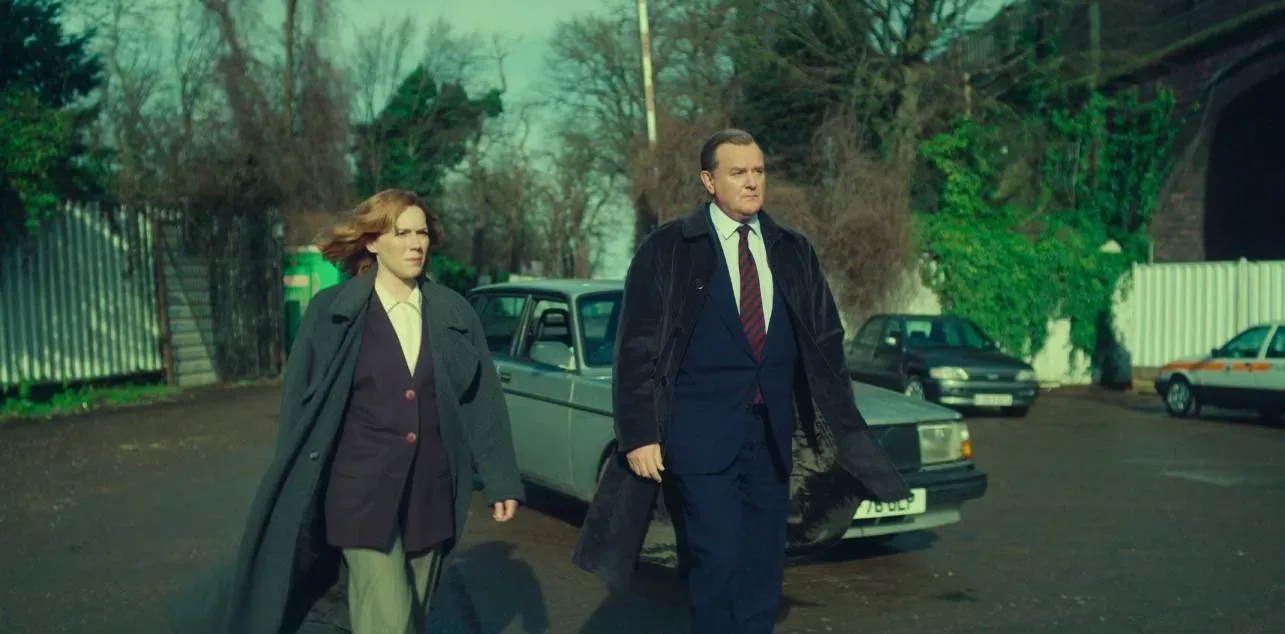All stories of stolen treasure are, at their foundation, stories about a void. The first season of The Gold showed us the solid object: its theft, its melting, its dispersal. The second season concerns itself with something far heavier—the half that vanished.
It is a narrative built around an absence, a gravitational phantom pulling everything into its orbit. We have lept forward into the 1990s, an era where the brutalist grit of the old decade gives way to a slicker, borderless world. This new landscape is the perfect place for a ghost to thrive.
The story moves beyond London’s confines, becoming a global pilgrimage of sin and consequence. We find John “Goldfinger” Palmer in Tenerife, a sun-bleached Icarus building a kingdom on a lie. We meet Charlie Miller, a man burdened with the physical weight of this mythical bullion.
And we watch DCS Brian Boyce, a man condemned to the Sisyphean task of chasing a shadow. The series understands that when historical record dissolves, a space is cleared for legend. Here, in the empty space left by history, a new and perhaps more potent truth is forged.
Orbits of Corruption
The plot fractures, mirroring the schism in the stolen loot. Two distinct paths of damnation unspool across the globe. Palmer’s life in Tenerife is not the paradise it appears; it is a meticulously constructed purgatory. When his name appears on the Sunday Times Rich List, it is not a coronation but an alarm.
The notoriety summons new demons, some wearing police uniforms and others speaking Russian, and the sun-drenched scenery begins to feel like the walls of a shrinking cell. His paranoia becomes the true punishment, a corrosive agent eating his empire from within.
Meanwhile, Charlie Miller’s journey is a pilgrimage of contamination. He is the reluctant apostle carrying the cursed relic from the dark earth of a Cornish mine into the ethereal world of offshore accounts. He seeks not just wealth but a kind of baptism, a cleansing of his past through the abstract rituals of high finance.
Connecting these expanding circles of decay is Boyce’s investigation, a slow, grinding force against oblivion. His team haunts the periphery of these new lives, their patient surveillance a quiet existential threat that whispers beneath the loud cacophony of ill-gotten success.
Masks of Becoming
Each character is a study in the desperate performance of identity. Hugh Bonneville’s Boyce is a man worn down to a single purpose; his visible exhaustion is the texture of a soul eroding against an immovable object of crime.
Tom Cullen plays Palmer with a brilliant, shimmering confidence, a mask so perfectly rendered one almost forgets the anxious, hollow man beneath. He is playing the part of “Goldfinger,” a role that is slowly consuming him.
The new figures are archetypes of this fractured world. Sam Spruell gives Charlie Miller a profound sense of dislocation. He is a man caught between two worlds, the raw physicality of the old underworld and the bloodless, intellectual cruelty of the new one. His stated ambition—to become a villain so that one day he might not have to be one—is a heartbreakingly human paradox.
Joshua McGuire’s Douglas Baxter is a creature of pure, seething resentment, a grotesque manifestation of class anxiety given dangerous intelligence. These are men not finding themselves but desperately trying to construct a self that can survive the world they have entered.
The Alchemy of Narrative
The show’s pivot from documented history to speculative fiction is its most daring act. It is a leap into the abyss of what might have been, a recognition that when the facts run out, the human imagination must light the path.
This season is less a forensic account and more a philosophical exploration. The introduction of composite characters is not a failure of historical rigor but a symbolic necessity. These figures represent the abstract forces the gold unleashed: institutional rot, class warfare, and the insidious creep of corruption into the very bedrock of society.
The series proposes a dark alchemy. The Brink’s-Mat gold was not merely a stolen commodity; it was a catalyst. It transmuted the base metal of street-level thuggery into the sophisticated, invisible systems of modern global finance.
It dissolved the line between the criminal and the legitimate until the distinction itself became a quaint fiction. In the silence where history offers no answers, the show constructs its own grim and resonant truth.
The Gold premiered on BBC One on 12 February 2023, with all six episodes available on BBC iPlayer simultaneously; it later launched on Paramount+ in September 2023 (US release date: 17 September 2023).
Full Credits
Director: Aneil Karia, Lawrence Gough
Writers: Neil Forsyth
Producers: Charlie Leech
Executive Producers: Neil Forsyth, Ben Farrell
Cast: Hugh Bonneville, Dominic Cooper, Charlotte Spencer, Jack Lowden, Tom Cullen, Emun Elliott, Sean Harris, Stefanie Martini, Emun Elliott
Director of Photography (Cinematographers): Aneil Karia credited as director; cinematographers known include (IMDb lists 3 cinematographers, but primary DOP not separately named in sources)
Composer: Simon Goff
The Review
The Gold Season 2
The Gold evolves from historical recounting into a compelling meditation on absence and mythmaking. It bravely fills the void of the historical record with a dark, philosophical inquiry into the nature of corruption and identity. While the shift to speculative fiction might distance some viewers, the series gains a deeper resonance by portraying not just a crime, but the birth of a modern financial darkness. It is a haunting and intelligent examination of the ghosts that treasure leaves behind, trading the certainty of fact for more unsettling truths.
PROS
- A philosophically rich narrative that explores identity and corruption.
- Strong, nuanced performances from the entire cast.
- An intelligent and thematically purposeful shift into speculative fiction.
- Successfully manages complex, interwoven international plotlines.
CONS
- Its departure from documented history may not appeal to true-crime purists.
- Some new characters feel stylistically broad compared to the established figures.
- The police investigation is intentionally methodical, which may feel slow to some.
